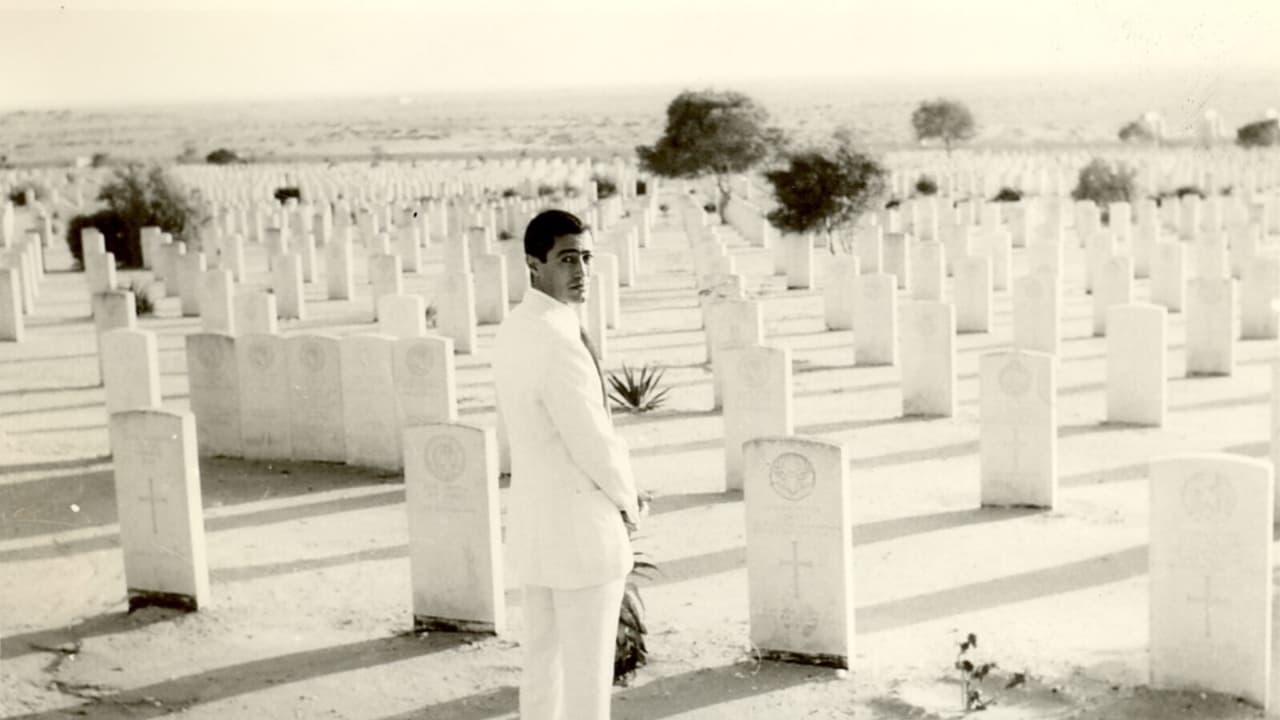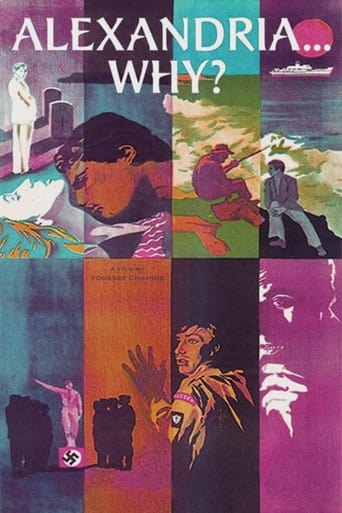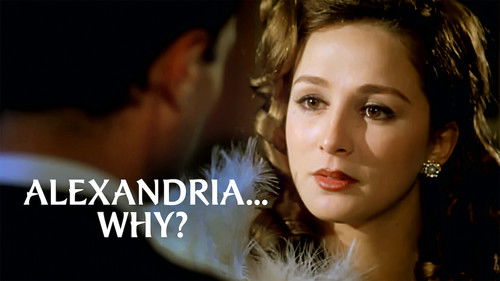


Too much of everything
... View MoreIntense, gripping, stylish and poignant
... View MoreTells a fascinating and unsettling true story, and does so well, without pretending to have all the answers.
... View MoreThe movie runs out of plot and jokes well before the end of a two-hour running time, long for a light comedy.
... View MoreThe first part of Youssef Chahine's semi-autobiographical trilogy concerns a young student and his frustrated dreams of being an actor in WWII-era Alexandria. While not as stunning as CAIRO STATION, it's a warm and easily relatable story with strong characters (charming lead performance by Mohsin Mohieddene) and flashes of brilliance, including Fellini-esque fantasias and clever use of stock footage and ironic music. The amateur play scenes are standouts. The problems arise when it comes to the other stories interwoven with the main plot. These cover such controversial material as an aristocrat who "buys" a drunken Allied soldier to kill him for amusement but falls in love with him instead, a group of inept Communists plotting to capture Churchill, and a Jewish girl impregnated by a Muslim boy. Each of these subplots could well be a fine film on their own, but the transitions between them are too abrupt, and rightfully pegged in other reviews as "sloppy" and "messy". It leads to a lot of confusion and the nagging feeling that Chahine is piling too much on his plate.
... View MoreI love this movie simply because every time i watch it, i can see myself, my life and my family in every scene. I can see my depression and my dreams, how hard it was to commence a dream and how much it took to start. I can see my parents waving. I can see my sister in Beirut while the war started and we try the best to get her out. I can see how my parents managed to save every penny to send me here to study what I want. I can see my poring job and my girl, my friends and how we became apart. In short this movie is all about me. My roots in Alexandria. I miss it very much. I have been here over two years now. But I am sure I will be back one day.
... View MoreYussef is one of the masters of Egyptian Cinema, and I think he got himself a good reputation abroad, specially in France and Russia. He was always criminally ignored by Hollywood, though he studied Cine art in NY. However, he developed this Fellini complex recently. He keeps talking about his youth, his sexual complexes, his relations with parents, his study of Cinema, conflicts with the totalitarian governments.. etc. Yussef comes from a very marginal society in Alexandria, being Catholic (most of Egyptian Christians are Orthodox), from a fairly rich family, being educated at Victoria college. Till now his Arabic language is not perfect. From this marginal area he tries to give us a very complex panorama of the Egyptian society during WW II, when Germans were about to conquer Alexandria, and the British were about to flee. Some Egyptians thought that Romel would be their liberator from the British occupation. Here, you find a complete mess from Egyptian Islamists (Muslim brothers), Jews, communists, aristocrats, Catholics, British soldiers, Nazis ... etc... Very complex that U spend 1 hour trying to figure anything... U got only 3 seconds for every character to understand his attitude and problem. Then, in the second hour, things get better and U begin to appreciate this director. The movie gets emotion and U care for characters...The final shot shows Miss Liberty while the young man stands on board on his way to US to study Cine art. Then we see Miss Liberty's face closer and we discover it's the face of a prostitute heavily covered with make-up, and she laughs loudly and obscenely. This summarizes his memories about his USA experience. Americans won't like this scene, but they will like it in East Europe and Russia. My opinion is that Mr Shahin is a genius film director, but is a very bad script writer. However, it's impossible to convince him otherwise because he has always done what he thought was right, and he is 80 now ... No hope for change !
... View MoreFor a director who has been making movies for nearly 60 years, Youssef Chahine is still criminally unknown outside of Arabia and Europe, even in critical circles. The widest release outside of Europe for any of his films was a very limited run in the US for 1997's "Destiny", and only five or six of his films are available on Region 1 DVD. Still, dedicated cinephiles who have studied world cinema will inform you that Chahine is considered one of world cinema's great masters. He has been nominated for no less than seven awards at Cannes, five of them either for the Palme D'Or or its predecessor, the Grand Prize. Chahine won a Lifetime Achievement Award in 1997 at Cannes, as well. He has been awarded numerous other awards over the course of his illustrious career and has made some of the best regarded works in Arabic (specifically Egyptian) cinema. So why hasn't he achieved recognition across the Atlantic? His films are dense, rich, colorful, articulate, controversial, and endlessly fascinating, but they are also difficult. Few Chahine films can be watched and fully understood in one sitting, and even fewer are fully enjoyed on first viewing. Occasionally Chahine's films fall prey to his complex plots and multiple layering, and though it is still a good film, "Alexandria Why?" is one of his most difficult and muddled films.The film, set during World War II tells multiple stories, one being Chahine's own story through the character of Yehia (played excellently by Mohsin Mohieddene), a young man in Egypt with directorial ambitions but the passion to be an actor, who frequently watches the same film repeatedly at his local cinema out of fear that he missed something the first time, performs Shakespeare, struggles with social and familial pressures, falls in love, and pursues his dream of studying acting at the Pasadena Playhouse. This is the film's main story, but subplots include a Jewish-Muslim romance where the female character is pregnant, a homosexual romance between a gay English soldier and a wealthy Arab, and a wacky, often funny plot featuring a group of communists who plan to kidnap Winston Churchill in hopes of ending the war.Though certainly not Chahine's first controversial film (his masterpiece "Cairo Station" was banned for twelve years in Egypt after its first run of screenings in 1958, and understandably so, being a film about a sexually frustrated, handicapped fetishist), "Alexandria Why?" created quite the furor in conservative Islamic Egypt upon first release, it made bold statements on global politics, suggested (truthfully) corruption in Egypt's political structure, supported communism, and featured a homosexual relationship between a British soldier and a wealthy Arab, among other taboos. Chahine designed his script not only to tell the story of himself as a young man, but to tell his story as part of a bigger one, the story of the social and political climate in Alexandria, and the story of what he clearly believes to be incorrectly considered social taboos come to life. This is a brave and challenging film which affected me more than most films I've seen recently, all the more surprising since I thought it was a lacking effort from a director whose films are generally quite brilliant.The words 'stock footage' have negative connotations in any film fan's mind because it is so often used ineptly, but here the stock footage of WWII used brings the war to life at an appropriate distance and is edited cleverly and realistically into the film, so we never feel that we are watching a cheap production. That said, the overall production design on this fairly low-budget film is minimal, but when the film does look expensive in about three or four scenes, the money is used well. Unfortunately Chahine slips into some unfortunate mistakes like using footage from "An American in Paris" when that film was released several years after the Second World War ended. The photography is on occasion sloppy, but more than often it is precise and adds a lot to the mood of the film. There is not much of an original score used in the film as Chahine prefers to use a variety of music clips from various sources to suit whatever point the film is at. The music works perfectly with the film, but it so varied I cannot imagine it would make good listening as an album.Ultimately it is the film's occasional sloppiness that lets it down, as well as Chahine's tendency for complex plotting. This would have been perfect as a two hour film about Chahine as portrayed through the character Yehia, but his desire to comment on more than himself brings the film's quality down. Its script is excessive and often incoherent, and although there are some exceptionally shot scenes like that in which Yehia directs his first theatrical performance, the film on a whole is more remarkable for its ambition, scale, viewpoint, and characters than the end product. It is muddled and messy at times, worth watching but certainly not Chahine's best as sometimes named by critics. Chahine's later films in his autobiographical trilogy, "Egyptian Story" and "Alexandria Again and Forever" are better ways to appreciate Chahine's cinema and the character Yehia, as is his very best, most original, and bravest film "Cairo Station", which I honestly consider one of the great masterpieces of cinema.7/10
... View More